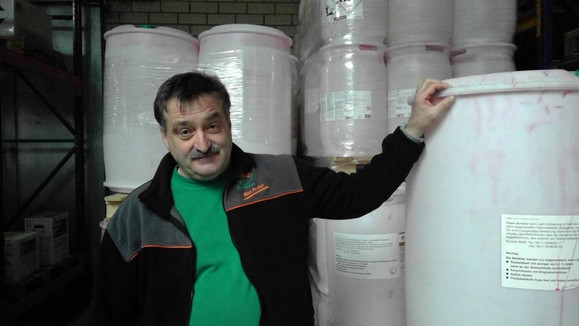It is little because “only” around 60 tonnes are recovered per collection at PAMIRA BEIZE – a tiny amount compared to the roughly 3,000 tonnes that PAMIRA® manages. But there are a lot of standards to meet on the road from preparation to planning, operative implementation and comprehensive documentation in line with waste law.

10. February 2018
PAMIRA BEIZE – The “little” brother system in the recovery of pesticide packaging

PAMIRA BEIZE is ready to go in 2018. 800 potential seed dressing companies were informed about the process in late November. Around 400 seed dressing companies, retailers and seed manufacturers have already registered seed dressing packaging. One of them is Raiffeisen Waren Zentrale (RWZ) in Friedberg, located in one of Germany's most fertile regions for arable farming, the “Golden Wetterau”. Seed dressings play a crucial role here – and the RWZ site gets through a huge number of seed dressing barrels. Stefan Dauth is the branch manager. In an interview with the RIGK REPORTER in January 2018, he explained that they have been participating in PAMIRA BEIZE for ten years now. This time he has registered 86 x 50 litre and 17 x 200 litre barrels, plus a few smaller seed dressing canisters, which can also be handed in at the PAMIRA collections. But only if no residue remains inside – something that is not always the case. This highlights one of the key differences from PAMIRA: seed dressing packaging often contains a small amount of active ingredient and rinsing residue. That is why they are recovered separately from PAMIRA. Recycling is not an option. Instead, they have to be incinerated in plants specially approved for the task. Waste law thus demands that they are documented as “packaging containing hazardous substances”, meaning that all recoveries must be documented with taking back protocols and special approval is required.
Now that preparation and planning are complete, what will 2018 bring? The next deliveries are planned for the first week in March. Around 200 companies have registered to bring their packaging, together with the protocol, to 35 collection points. Collection is free for those delivering, as long as their packaging meets the criteria: completely empty, sealed, clean from the outside, and clearly labelled. Experienced staff are required to check the criteria strictly, but proportionately. Recovery and recycling are funded by those who fill and sell seed dressings.
Coming back to the upcoming collection in Friedberg, Stefan Dauth is pleased with the way the system is subject to constant development. “As seed dressing retailers, we have a clear role to play. Specifically, we collect the barrels from our customers and store them centrally at our warehouse – protected from rain and wrapped on pallets. That is what a cooperative partnership means to us.”
In short, having started with a few pilot projects 15 years ago, the process has now become standard and is valued by PAMIRA BEIZE customers. Or in other words, the “little” brother system in the recovery of pesticide packaging is no longer quite so little.
More information:
Thomas Neck, System Manager Beize
T: +49 611 308600-29
neck@rigk.de
More information about BEIZE